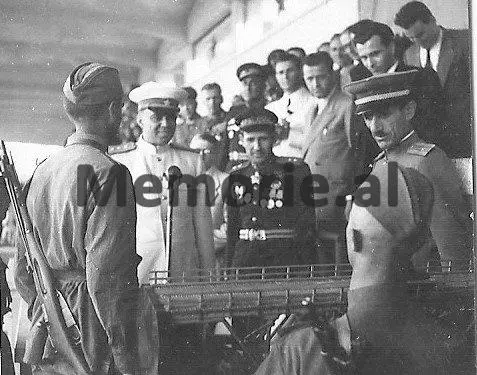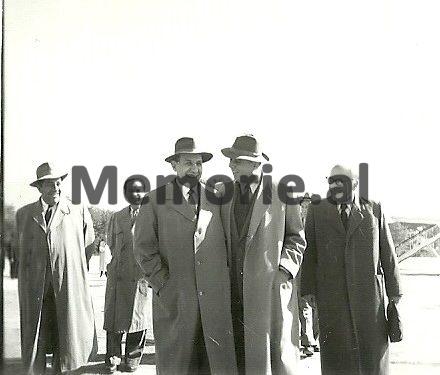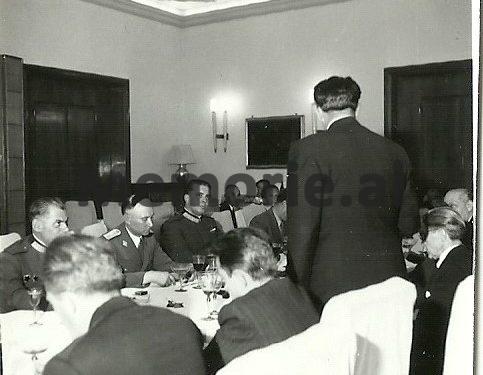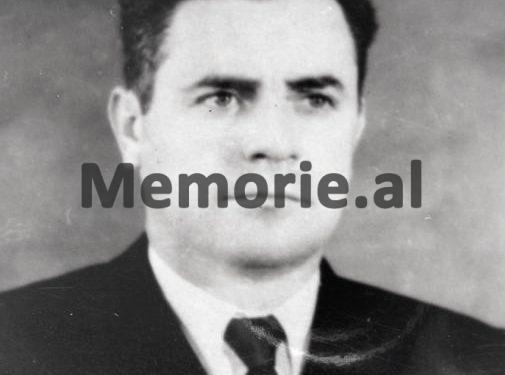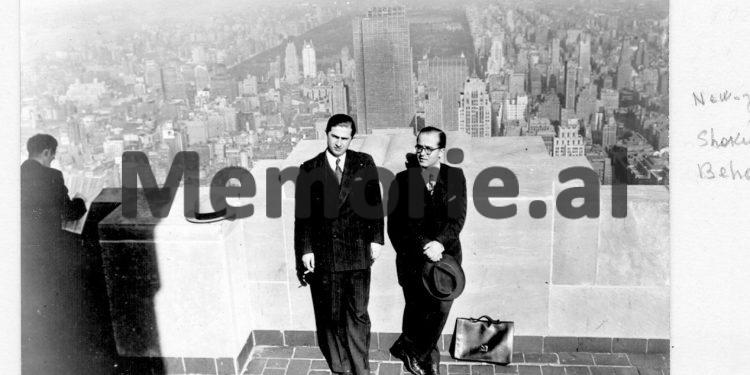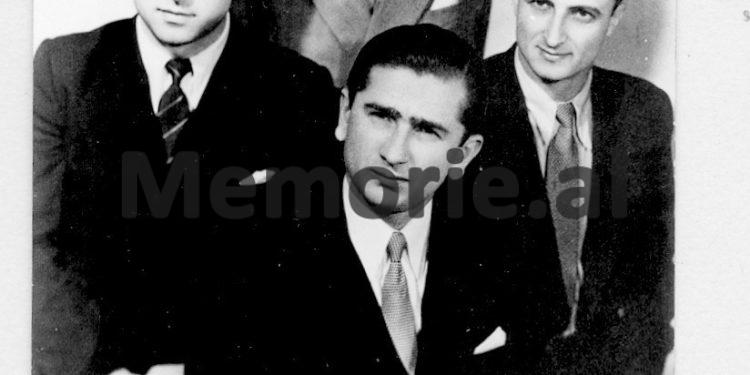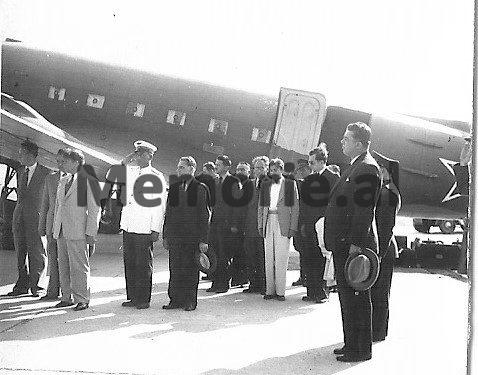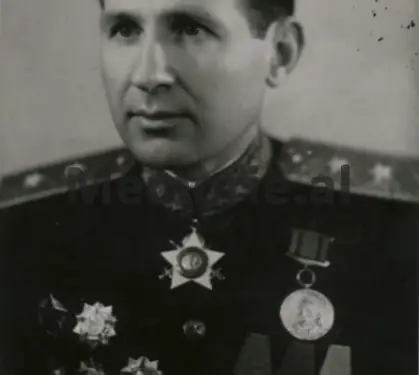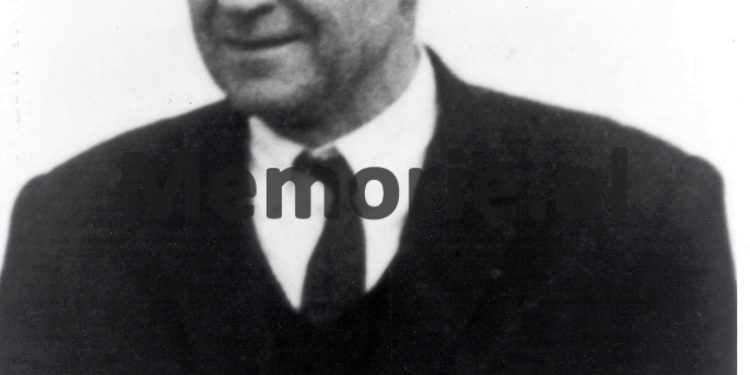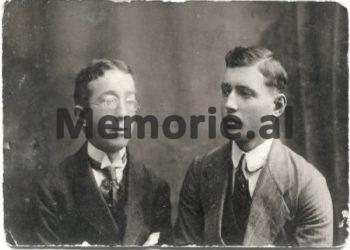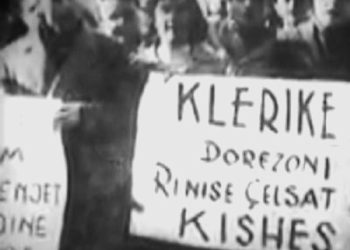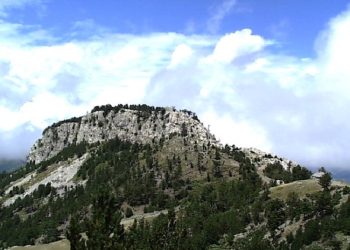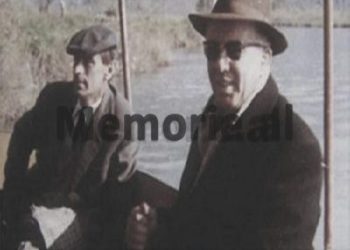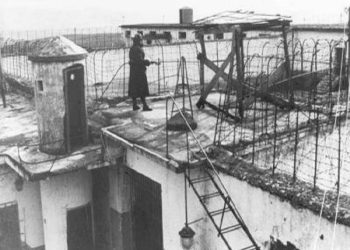Dashnor Kaloçi
The fourth part
Memorie.al publishes the unknown story of Major General Panajot Plakut, originally from the village of Hoçisht in Devoll, Korça, who after graduating from the “Normal” school in Elbasan in 1936, returned to the city of Korça where he joined groups. communist and during the occupation of the country 1939-1944, he joined the Antifascist Movement and for his activity was arrested and imprisoned by the Italian authorities in the city of Durres and after his release, he joined the partisan ranks, being appointed deputy commissioner of the First Assault Brigade commanded by Mehmet Shehu, since its formation in August 1943, in the village of Vidhkuq in Korça. How Panajot Plaku climbed the military career ladder after the end of the War, starting from Commissar and Division Commander in Korça District, Corps Commander, Director of Operational Directorate and Deputy Chief of General Staff of the Albanian Army in the Ministry of People’s Defense with rank and Major-General, Deputy Minister of National Defense for the Border Directorate, to the post of Minister without Portfolio in the government headed by Mehmet Shehu? How could Panajot Plaku escape from Albania in June 1957 (when he was acting Minister without Portfolio and Chairman of the State Committee for Geology) secretly crossing the state border near Lake Pogradec and exiting to Yugoslavia, where he settled in Belgrade as a political asylum and sent a letter to the leader of the Soviet Union, Nikita Khrushchev, denouncing all the crimes of Enver Hoxha and his regime?! The mystery of the death of Panajot Plaku in 1966 in the hotel where he lived in Belgrade and what he wrote in his memoirs about Enver Hoxha and the senior leadership of the ALP, which he summarized to be published in a book entitled ” Violence over the Revolution in Albania “, and after his death it was also translated into Serbo-Croatian (by Predrag Vuivivi,, editor of the newspaper” Borba “and Vela Popovi,, editor of Belgrade Television), a book that had a great echo and was later published by the Publishing House “Rilindja” of Prishtina in Albanian language in 1985
Followed by the last number
The pursuit of Panajot the Elder by the State Security!
The pursuit of Panajaot the Elder by the State Security had begun when he was in the military with the rank of Major-General, and it was at that time that he was not allowed to take with him a young man originally from Devolli in the district of Korça, whom he had a very trusted man, but his companion was assigned by those of the State Security Directorate to the bodies of the Ministry of Internal Affairs. According to the task taken by his companion from the State Security, he did not leave Panajot for a moment, even when he went to his family in the village of Hoçisht in the Korça district in the Devoll area.
In this regard, his family members testify, among other things: “We remember a case when Panajoti went to visit one of our cousins in Tirana and there his companion asked him to make him coffee! But our cousin did not leave him, saying: ‘You cannot love Panajot more than we’! After Kalos’s death, Panajoti felt more and more threatened and given the situation he was in, he refused to cook for the cook who had been assigned to him, as he was afraid and foresaw that he would be poisoned, just like his brother his, passes. Although Panayot had studied and graduated from the Soviet Union, he could not stand the cult of Stalin.
This is how we remember the day when Stalin died and Panayot came home and said to his wife, Vjollca, who was crying: ‘What is there to cry about, Stalin lived as long as he wanted’. Likewise, when his sister, Lola, asked Panayot to intervene to regulate his right to study in the Soviet Union, he replied: ‘What do you want in the Soviet Union, better go to Poland, than the Poles are much more developed than the Soviets, ”and arranged for Lola to study in Poland.
One of the closest friends that Panajoti had was the President of Albania, Omer Nishani with his family that we had neighbors. “After the death of Omer Nishani, Panajoti was very indignant and expressed his surprise, saying: ‘how was it possible for a man like him to be buried in such a way”, recall the family members of Panajot Plakut, regarding the last period before he fled Albania.
The last days before the escape!
How did Panajot Plaku manage to escape from Albania in 1957, at a time when he was under the strict surveillance of the State Security that constantly followed him at every step in 24 hours and how long before he had made the escape plan? In this regard, his family members testify: “None of us in the family had any knowledge of Panajot’s plan for his escape from Albania, but by making logical deductions, with the behaviors and actions he did before the escape and his condition extremely aggravated spirits, especially the last months, after his departure we drew the conclusions, that he had planned the escape immediately after the death of his brother, Kalos. Just one day before the escape, Panayot sent a letter to his sister, Lola, who was studying in Poland, where, among other things, he wrote: You sister should know what any relative of the family can do and whatever to happen; you have to be with the Party. “So in a word, he was preparing Lola, for what would happen next. Those three days before he escaped, Panajoti made several visits to his relatives, taking some pictures with them. Also, the last two days before the escape, he took some pictures with his wife, Vjollca and their three small children. The last night before the escape, Panajoti locked himself in his room and cried all the time non-stop. In the morning when he was leaving his room, he told his wife, Vjollca, that he would go on duty. Vjollca said: “Okay, but when you go there, call us”, and Panajoti replied: “Where I will go, I cannot call you”. That morning in May 1957, when Vjollca went out to accompany him with the little boy by her side, Panajoti said: Little Besi, where are you leaving… ”, and closed the car door!
Letter from the former Minister without Portfolio, Major General Panayot Plakut, to the leader of the Soviet Union, Nikita Khrushchev, in 1957
“You know why Tuk Jakova was labeled an enemy of the Party. This happened because in his discussion in the Central Committee of the ALP, he spoke about the merits that Miladin Popovic had in the creation of our Party and that because he stood against four documents regarding the identity and personality of Enver Hoxha, which are presented in all museums, as the only documents for the formation of the Communist Party of Albania.
Tuk Jakova rose up against the cult of Enver and this fair discussion of his turned into an accusation, against Tuk himself. Do not these actions resemble those of Stalin against Postishov?! The only difference is the fact that Postishov was shot, while Tuk Jakova and Bedri Spahiu were expelled from the Party and the former became a carpenter and the latter an accountant. Another difference is the fact that the expulsion of Tuk and Bedri from the Party was decided by the Central Committee of the ALP, and that this decision was taken after the XX Congress of the Central Committee of the Communist Party of the Union of Soviet Socialist Republics.
It should be borne in mind that: if Tuku were supported by the comrades of the Central Committee, they too would experience his fate, and they would probably do something even more terrible than this, because in that case the slogan “the enemy is at the forefront of Party”, and would be formed against such members of the Central Committee of the ALP, who would support Tuk, the same court where Liri Gega, Dali Ndreu and Petro Bullati were convicted. This is called internal party democracy in Albania, after the XXth Congress of the Communist Party of the Union of Soviet Socialist Republics.
In such conditions, no one can be found who would raise vital issues for discussion, especially if these problems affect Enver Hoxha in any form. In such conditions there is no one who would fight for justice. In Stalin’s time there were six, seven, etc. in the Communist Party of the Soviet Union, which liquidated the role of the Politburo. In Albania this does not exist, but there is the so-called leader, which is officially called the Defense Council, which is neither the Politburo nor the Secretariat of the Central Committee, but something that is above them!
This leader includes some members of the Politburo and is commanded by Enver Hoxha. Decisions are made there whether the status of the party will be implemented or not, whether the laws of the state will be implemented or not, etc. For example, for the elimination of my brother Kalo Plakut, a decision was made by Enver Hoxha, Mehmet Shehu and Hysni Kapo. I think the Politburo has not been informed of this decision. But even in those cases when the Politburo has been informed, it is not able to change any decision, which is taken by the three persons mentioned above.
In the same way, the decision was made to liquidate me and to shoot Liri Gega, Dali Ndreu and Petro Bullati. There are hundreds of examples that prove that the collective decisions of the government are annulled or not implemented just because Enver Hoxha does not agree with them. For all these reasons, I think that the issue of internal party democracy for the ALP is a serious problem, so much so that it can hardly be solved and that without your direct help it is not possible to solve this fairly issues.
The other very important issue for the ALP is the issue of informing the party about all political problems. Not only the basic organizations of the party, but also K.Q. Its members are very poorly informed about various party issues. There is an extremely great and strange distrust of the top leading people of our party, not only towards the ordinary communists, but also towards the members of the K.Q. and government. The main source of this distrust is the numerous remnants of micro-bourgeois behavior and the indecision of Enver Hoxha. This is precisely the cause of his exclusivity and extremism. After the XX Congress of the USSR KP, they started sending the minutes of the meetings of the secretariat of the Politburo to the members of the plenum of the Central Committee.
As a rule, these minutes were sent with great delay, so that when they reached the members of the K.Q., the decisions that were included in those minutes were already in the process of implementation. However, after a short time, on the pretext that the secrecy of those decisions was not being kept, they stopped sending the minutes, saying that they could be read in the apparatus of the Central Committee. But since none of the members of the plenum came to the Central Committee to read them, they decided to send them again.
To illustrate how poor the party information is, I will point out an example. Not only the basic organizations of the party, but also K.Q. of our party live in the conviction that the Yugoslavs are agents of imperialism, enemies of Albania and they are surprised when you talk about rapprochement with them, about the consolidation of relations with them, that we should not be based on those things that divide us, but on what we have in common with them, etc.
Before I left Albania, I also saw and thought that you and your party are trying to bring Yugoslavia closer to the socialist camp, to prevent it from finally joining the imperialists, and so on. If you had not told our delegation of the government and the party, when he was in Moscow, that the Yugoslavs are not agents, that Yugoslavia will never attack any of our countries, that our party does not look at relations indifferently and cold-bloodedly. Albanian-Yugoslav, I would rather be killed than cross the border. Is it possible in such conditions to expect any improvement in the relations between Albania and Yugoslavia? Certainly not and here’s why.
In an informative meeting of the Central Committee plenum, which was held on the occasion of the return of the government and party delegation from the Soviet Union, Enver Hoxha said that you have criticized us for straining relations with Yugoslavia, for excessive nervousness about to this issue, that you have advised us to make efforts to get closer to Yugoslavia, without stopping the ideological war against revisionism and against the worldview of Yugoslavia, etc. After the meeting Enver and some friends of K.Q., among who I was, went to the Party House to relax and there talked about some problems related to the economic development of our country and relations with Yugoslavia.
Enver then said, among other things: “How credulous are the Bolsheviks, because it is clear to me that the Yugoslavs do the work of agents, they are the enemies of our country and of course we cannot approach them.” I do not know how the Yugoslavs view the relations between Albania and Yugoslavia, but I am convinced that nothing has been done by Albania, and nothing is being done today in the interest of rapprochement, on the contrary. The State Security is strictly following all those who say at least one good word about the Yugoslavs, arresting and investigating them, or infiltrating them into remote corners, or even liquidating them completely.
Nor can there be talk of any improvement in relations between Albania and Yugoslavia, when those who have a friendly attitude towards it are imprisoned as agents of Yugoslavia, or even shot, when it is said that the discussions at the Tirana Conference, against party line and against the leadership, were organized by the Yugoslavs, although there was no such discussion. Memorie.al
The next issue follows




